Baby Elias is first child in Texas to receive partial heart transplant at Dell Children's
Elias Robinson-Rodriguez smiles at his parents and doctors. Like most 1-year-olds, he is quick to grab toys, put them in his mouth and chew and chew, trying to ease the pain of erupting new teeth.
Elias, though, isn't like other 1-year-olds. On June 23, he became the seventh known child in the world to have a partial heart transplant and the first in Austin and in Texas, according to Dell Children's Medical Center.
His doctors at Dell Children's took a chance on this novel procedure that replaces a child's bad heart valve with a healthy valve from a donor heart. The team had been following the case of the first partial heart transplant last year at Duke University Hospital in North Carolina.
Elias' story is now helping doctors rethink what is possible in pediatric cardiac care and what systems need to be in place to offer this treatment to more children.
"It's big," said Dr. Charles Fraser Jr., head of the Texas Center for Pediatric and Congenital Heart Disease at Dell Children's, a partnership between Dell Children's, the University of Texas Dell Medical School and its UT Health Austin clinic.
Understanding Elias
Abigail Robinson and Christian Rodriguez had gone through the pain of two miscarriages before she became pregnant with Elias. If he made it to full-term, he would be their miracle baby.
During an ultrasound at 23 weeks, doctors told Robinson there was a blood flow problem in her baby's heart. The family from Fort Cavazos, formerly Fort Hood, were referred to the doctors at Dell Children's.
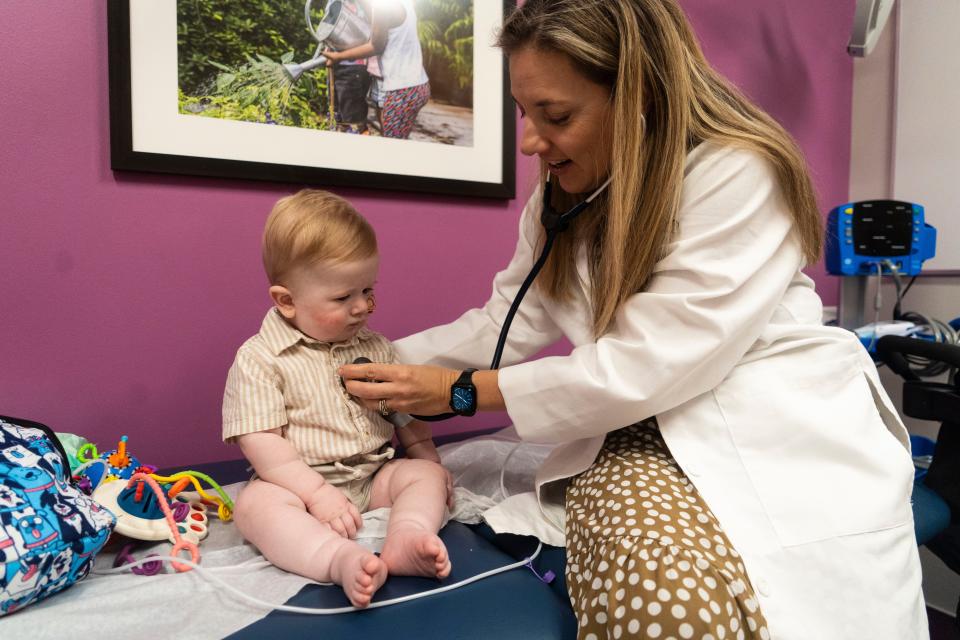
Based on ultrasounds, the Dell Children's team believed Elias had a transposition of the great arteries, a birth defect that happens when the main pulmonary artery and the aorta are switched in position. Elias also had stenosis of his pulmonary artery and a ventricular septal defect, which is a hole in the heart in the area that separates the two lower chambers of the heart.
The team planned to deliver Elias at Dell Children's to have immediate access to the cardiology team.
On July 14, 2022, Elias was born at 36 weeks. He looked a lot like his father, but he also had the signs of having an abnormal heart. Immediately, he went to the neonatal intensive care unit, where he would stay for 68 days.
"He was a little blue," Robinson said. "You could tell, especially in his feet."
At one month, cardiac surgeon Dr. Carlos Mery performed an arterial switch to put Elias' arteries in the correct place. What was once the pulmonary valve now serves as the aortic valve and vice versa. Mery also closed the hole in Elias' heart.
Elias was able to go home after he healed from that surgery. Having him home, "for me it was relief and joy," Robinson said. "But I was also nervous."
For Elias' father, an Army medic, "It's chilling being on the other side."
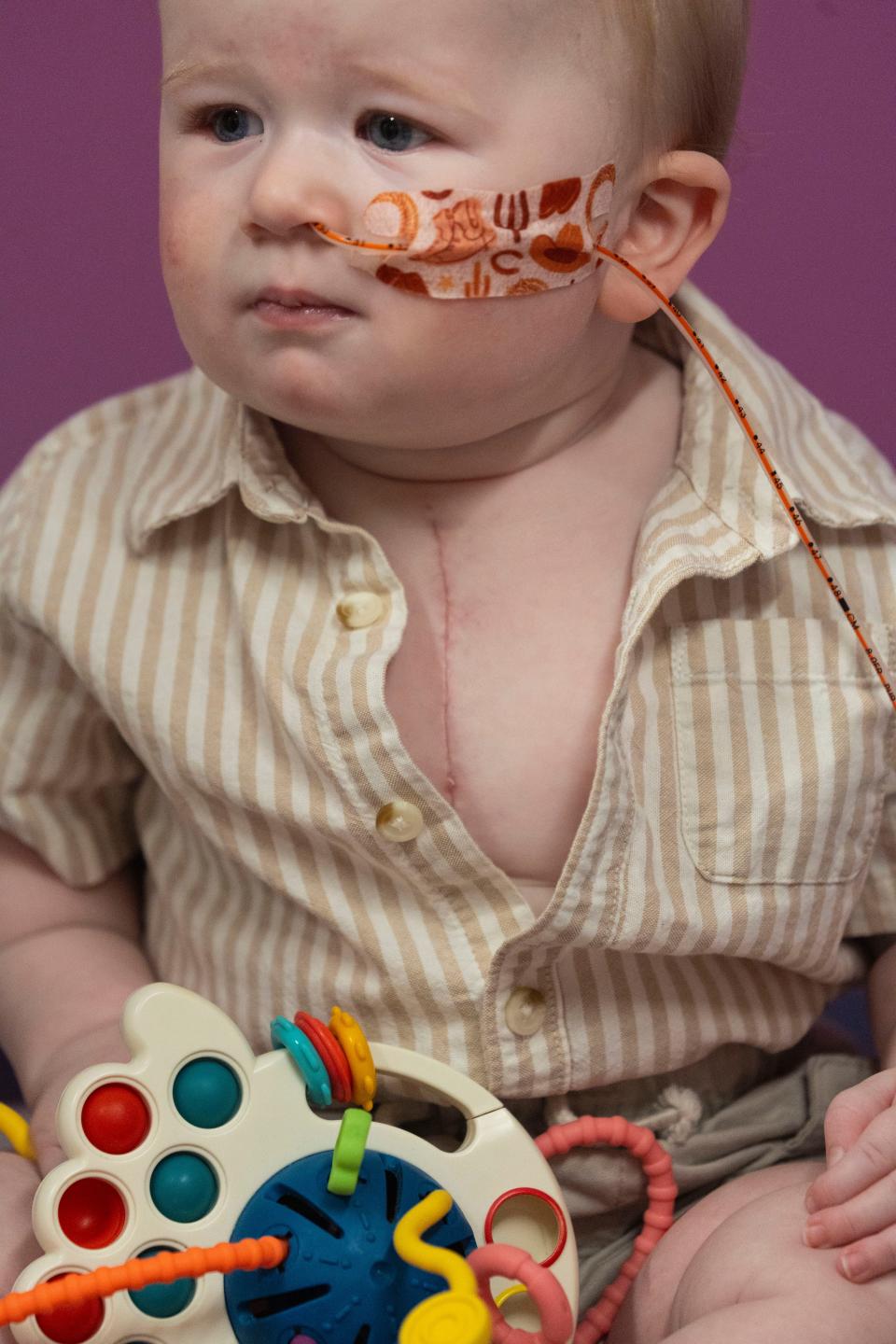
At home, there were no medical monitors to tell Elias' parents if he was breathing. They hooked up a video baby monitor to watch him breathe while he slept. Doctors told the new parents to watch for lips, fingertips and toes turning blue, indicative of a poor oxygen level, plus to monitor his heartbeat and signs of lethargy.
That first surgery held Elias until he was 6 months old. At that point, Mery opened up the aortic valve and cut away some muscle underneath the valve to allow it to have a wider opening. "Clearly, the valve wasn't great," Mery said.
By 10 months, based on Elias' heart function, it was clear the valve would need to be replaced. Robinson could feel Elias' heart beating differently when she held him on her chest.
"There was this swishing motion," she said.
A better option than a traditional valve replacement?
Until Duke performed that first partial heart transplant, the options in pediatric valve replacements were mechanical valves and graft valves from cadavers. Mechanical valves don't come in baby size, and neither option grows as the child grows.
Potentially, Elias and his parents could have faced six or seven more valve replacement surgeries until he was fully grown. "At some point, scar tissue starts getting worse and worse," Mery said, making each additional surgery more complicated.
Doctors have known that a heart in a heart transplant actually grows with the child because it is taken from a donor immediately after death or kept on life support until the heart is harvested.
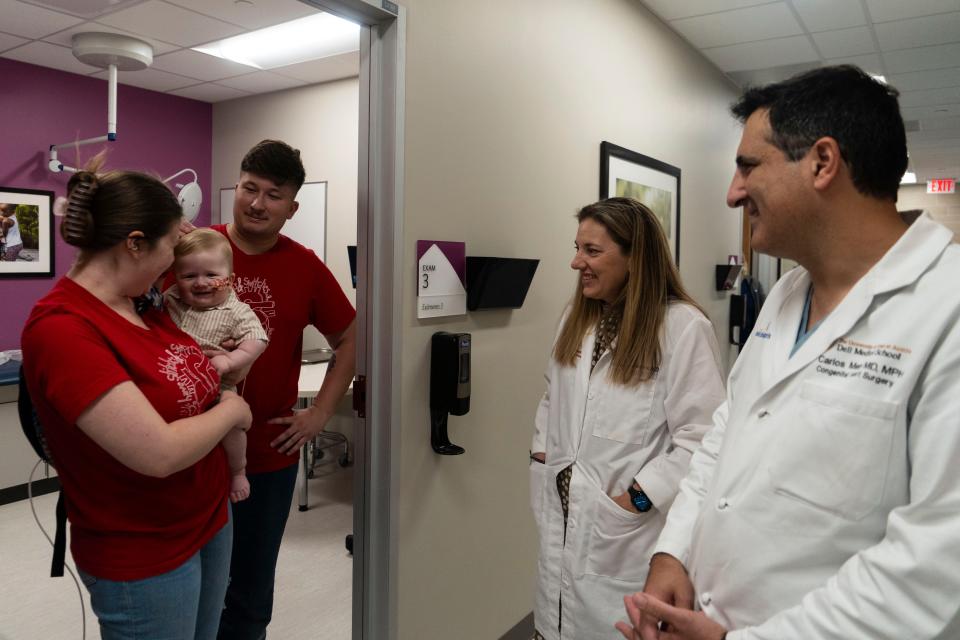
The theory behind a partial heart transplant is that the valves grow along with the child because the valves have been prepared the same way as in a full heart transplant. These partial transplant hearts aren't functioning well enough to be considered for a full heart transplant, but they have good valves for a donor.
"We don't have long-term data," Mery said of this procedure. After all, the first kid with a partial heart transplant is only a year post-surgery.
Doctors also don't know if children with a partial heart transplant need immune-suppressing drugs to fight off rejection for the rest of their lives, like patients with a full heart transplant.
Weeks before Elias' surgery, Dell doctors had been considering adding partial heart transplants to the program, said Dr. Chesney Castleberry, the medical director of the heart failure, ventricular assist device and transplant program.
To perform heart transplants, centers need approval from the United Network for Organ Sharing, which manages the organ procurement and transplant system in the United States. Partial heart transplants don't have a system in place.
Dell Children's also went to the U.S. Food and Drug Administration, which regulates mechanical replacement valves. Mery said the FDA does not regulate donor valves: "We were told, 'Do whatever you think is the best for the patients.'"
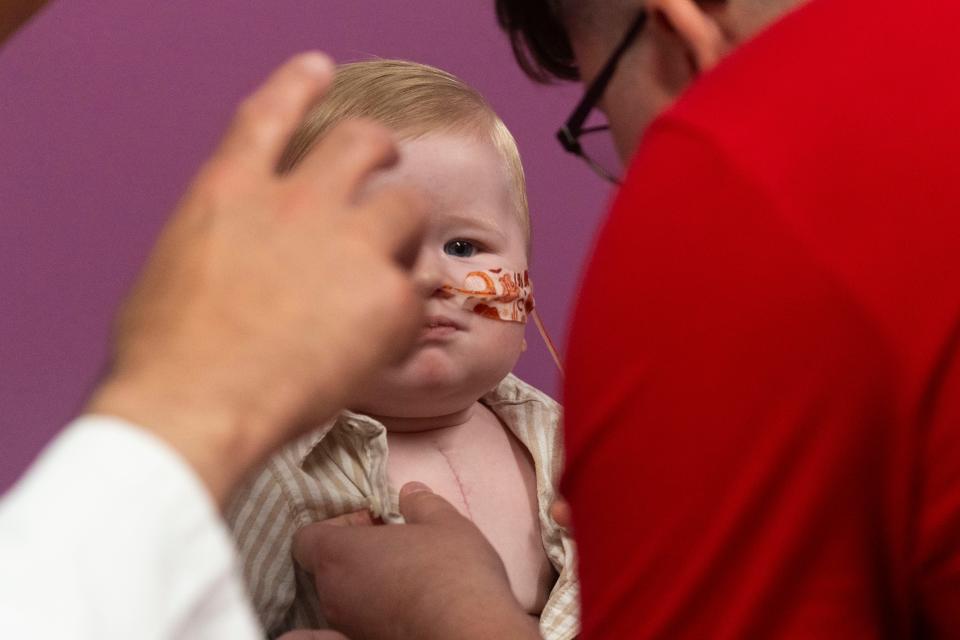
Without a mechanism to procure a heart and do a partial heart transplant, doctors asked other centers to call if an available heart that wasn't good enough for a full transplant but could be used for its valves.
Castleberry was in the process of drafting a letter to United Network for Organ Sharing to announce Dell Children's plans to start partial heart transplants when the perfect heart for Elias came up. "The stars aligned," Castleberry said. The heart was in a baby who was dying, but it wasn't a heart that would qualify for a full heart donation.
Elias' parents did as much research as they could before making the decision. Robinson contacted the mom of the first child with a partial heart transplant.
"Seeing her son doing well was relieving to see," Robinson said.
Launching a program: In first year of heart transplants, Dell Children's finds niche in cases other hospitals pass on
A big first step
Having never performed this surgery, Mery had a medical student bring six pig hearts to an operating room to practice procuring the heart valves from the heart.
"By the next day, we had already done it six times," Mery said.
On June 23, a team led by cardiac surgeon Dr. Neil Venardos went to the hospital to secure the baby's donor heart for Elias. Once the heart arrived at Dell Children's, Mery inspected the heart valves. He harvested the pulmonary and aortic valves from the donor heart. Elias was on a heart and lung bypass machine while Mery removed Elias' diseased valve and replaced it with the donor's healthy aortic valve.
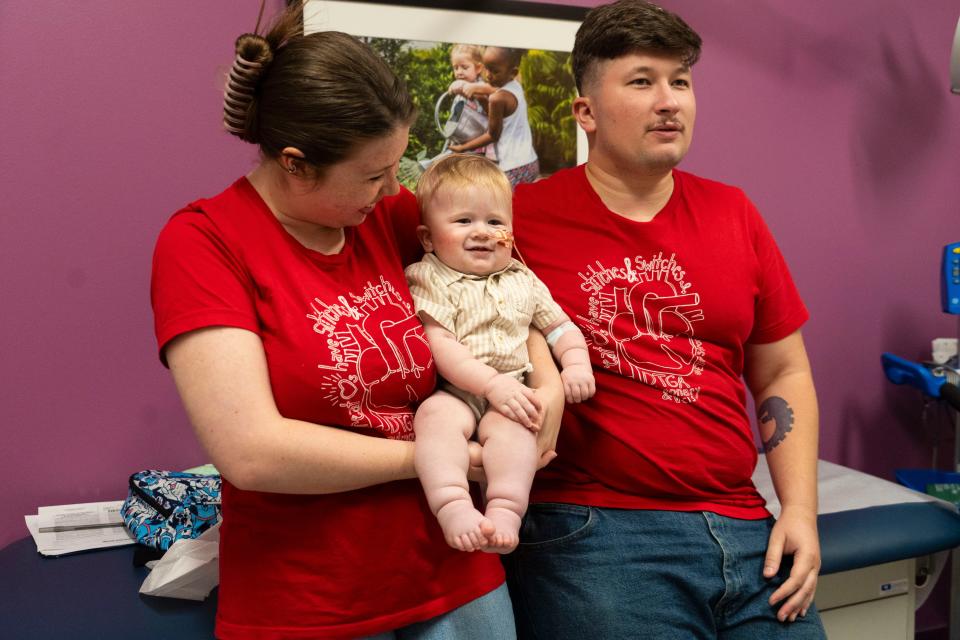
The surgery lasted 11 hours.
Robinson and Rodriguez waited in the hospital during the surgery. "It was the feeling of being nervous, but also knowing that he had a good team on hand," Rodriguez said.
Elias left the hospital less than two weeks later on the Fourth of July.
"He's always been a fighter," his mother said. "He's always been strong." Every day he got better. His skin glowed a healthy pink.
The future for Elias
At first, Elias had weekly checkups with the team, but now they are monthly. The only indication of his ordeal: a scar in the middle of his chest and the tube in his nose that feeds him. He is delayed in his feeding skills because his heart was so sick for so long. Elias will work with speech therapists on eating solid food.
Castleberry expects that some of the immune-suppressing medications Elias receives could be lowered or even weaned as he continues to recover.
As for the medical team, many questions remain about partial heart transplants, and they are working with the other transplant centers to develop protocols for these partial heart replacements.
"This is truly research," Fraser said. "Not everybody agrees that this is a good idea."
Will the valve grow with Elias?
"I'm very optimistic this will be the definitive surgery for him," Castleberry said, and his new valve "may be life-long."
If this works, other young patients might no longer face repeated valve replacements as they grow.
"It will revolutionize how we think about valve disease," Mery said.
For Elias' family, they are looking forward to watching him grow.
"He likes to be silly," Robinson said. "He likes to smile and play with balloons. He's happy to be here."
Trying new things: 'A 50-50 shot': How a Dell Children's team used a risky heart surgery to save a tiny infant
This article originally appeared on Austin American-Statesman: Baby Elias gets partial heart transplant at Austin's Dell Children's

